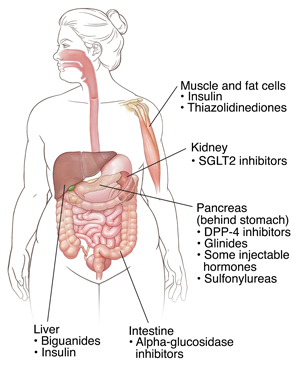Taking Medicine for Diabetes
Medicine can’t cure diabetes. But it can delay or prevent health problems. It does this by helping you manage your blood sugar. Taking medicines or having shots every day may seem hard. But they are vital tools to reach your blood sugar goals.
Where the medicines work
Diabetes medicines work on different parts of the body. Many of them affect how the pancreas makes insulin. Others increase how sensitive muscle and fat cells are to insulin. Or they keep the liver from releasing too much glucose. Some cause carbohydrates to break down more slowly. Or to be released more slowly from the gut into the blood. One type of medicine stops the kidneys from reabsorbing glucose from urine. The excess glucose then leaves the body via the urine. The diagram on this sheet shows where each class of medicine works in the body.

Get familiar with shots
Insulin can't be taken as a pill. It's most often injected through the skin to reach the blood. It’s not hard to give yourself shots. You may find that they aren’t as bad as you fear. There are new devices for injecting or inhaling insulin. Modern insulin pens are accurate. They are also easy to use and nearly pain-free, even for children with diabetes. Ask your provider for more information.
Stick to your medicine routine
It's important to take your medicines at the right times. This will give you the best control over your blood sugar. Having a medicine and diet routine can help keep your blood sugar steady. Keep track of medicines with a pill organizer. Make a daily schedule. Ask your family to help you stick to a medicine and diet routine. Make it a priority.
If you take other medicines
Medicines of all types can affect blood sugar. Tell your provider about all medicines you take. This includes prescription and over-the-counter medicines, vitamins, herbs, and supplements. Always tell the pharmacist that you have diabetes when buying other medicines. Try to get all your medicines from the same pharmacy or pharmacy chain. This way they are more likely to have a complete list of your medicines.
Wear a medical ID alert bracelet or necklace. This is helpful in an emergency. Bring a list of your medicines with you to all appointments. Check that your health records are up to date. They should have your current medicines and dosages. You may be able to download your records.